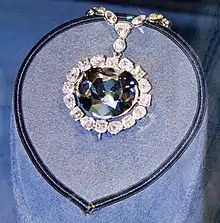jewel
See also: Jewel
English

A jewel.
Etymology
From Middle English juel, jewel, juwel, jeuel, jowel, from Anglo-Norman juel, from Old French jouel, joel, joiel, of uncertain origin. Perhaps based ultimately on Latin gaudium (“joy”), or on Latin iocus (“joke; jest”). Compare Medieval Latin jocale.
Pronunciation
- (Received Pronunciation) IPA(key): /ˈdʒuːəl/, /ˈdʒuːl/, /ˈdʒʊəl/
- (Canada, General American) IPA(key): /dʒul/, /ˈdʒu.əl/
Audio (US) (file) - Rhymes: -uːl, -ʊəl
- Homophone: joule
Noun
jewel (plural jewels)
- A precious or semi-precious stone; gem, gemstone.
- A valuable object used for personal ornamentation, especially one made of precious metals and stones; a piece of jewellery.
- ante 1611, William Shakespeare, The Tragedy of Cymbeline, act I, scene vi, lines 188–9:
- Iachimo: 'Tis plate of rare device, and jewels / Of rich and exquisite form, their values great.
- ante 1611, William Shakespeare, The Tragedy of Cymbeline, act I, scene vi, lines 188–9:
- (figuratively) Anything considered precious or valuable.
- Galveston was the jewel of Texas prior to the hurricane.
- (Can we date this quote?) William Shakespeare
- our prince (jewel of children)
- A bearing for a pivot in a watch, formed of a crystal or precious stone.
- (slang) The clitoris.
- 2008, Another Time, Another Place: Five Novellas
- The area between her eyebrows wrinkled with the increasing circular motions her two fingers made on her jewel.
- 2008, Another Time, Another Place: Five Novellas
Synonyms
- See also Thesaurus:gemstone
Derived terms
Translations
gemstone
|
|
valuable object for ornamentation
|
|
anything considered precious or valuable
bearing for a pivot in watch
- The translations below need to be checked and inserted above into the appropriate translation tables, removing any numbers. Numbers do not necessarily match those in definitions. See instructions at Wiktionary:Entry layout#Translations.
Translations to be checked
Middle English
This article is issued from Wiktionary. The text is licensed under Creative Commons - Attribution - Sharealike. Additional terms may apply for the media files.